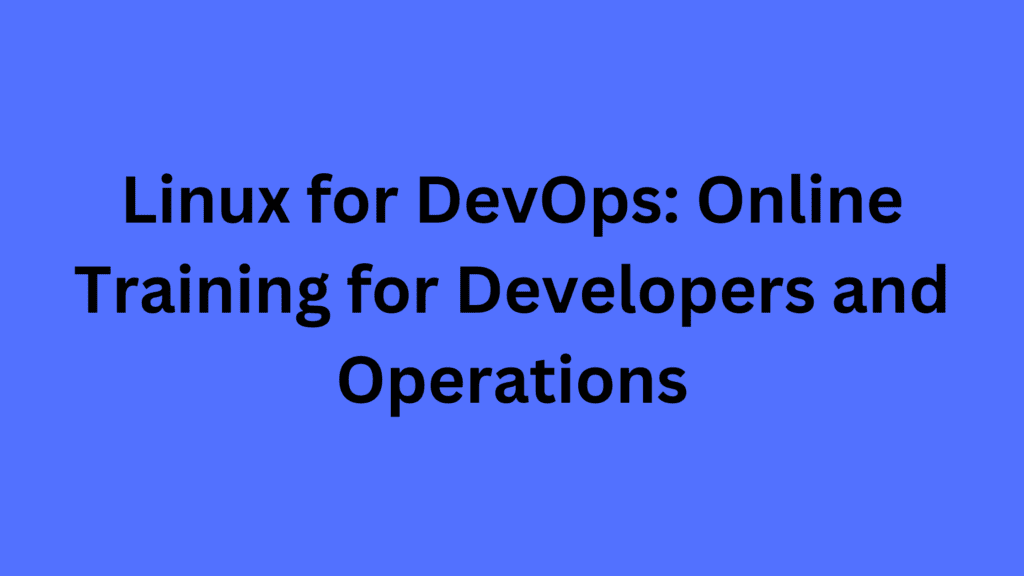
In the dynamic landscape of software development and IT operations, DevOps has emerged as a game-changer. It’s a cultural and technical movement that emphasizes collaboration between software developers and IT professionals, resulting in faster, more reliable software delivery. At the heart of DevOps is Linux, the open-source operating system that powers a significant portion of the world’s servers. If you’re a developer or operations professional looking to harness the power of Linux for DevOps, online training is your gateway to success.
Visit Cloud DevOps Training
The Convergence of Linux and DevOps
DevOps encourages collaboration between development and IT operations teams, with the goal of automating and streamlining the software delivery process. Linux, with its robust command-line tools, scripting capabilities, and open-source nature, is perfectly suited to support this collaborative approach. Here’s why Linux is an integral part of DevOps:
Scripting and Automation: Linux provides a powerful command-line interface and scripting capabilities. DevOps engineers leverage these features to automate tasks, configure servers, and manage infrastructure as code.
Containerization: Technologies like Docker and Kubernetes, commonly used in DevOps practices, are natively supported on Linux. Linux Containers (LXC) serve as the foundation for containerization, enabling easy deployment and scaling of applications.
Configuration Management: DevOps relies heavily on tools like Ansible, Puppet, and Chef for configuration management. These tools work seamlessly with Linux systems, enabling consistent and automated server configurations. Version Control: Linux offers a rich ecosystem of version control systems, such as Git, which is fundamental to the DevOps principle of versioning infrastructure code.
The Benefits of Linux for DevOps
Open Source Advantage: Linux’s open-source nature means that you have access to a vast repository of software, tools, and libraries, making it cost-effective for organizations.
Security and Stability: Linux is known for its robust security and stability, which is crucial in a DevOps environment where reliability and consistency are paramount. Customization: With Linux, you have the freedom to customize your environment
to suit your specific DevOps requirements. This flexibility is vital for meeting the unique needs of different projects.
Online Training for Linux in DevOps
Online training for Linux in DevOps offers a structured and comprehensive approach to mastering the skills you need. Here are some key components of a good Linux for DevOps online course:
Command-Line Proficiency: In a Linux DevOps course, you’ll learn how to navigate the command line efficiently. This skill is essential for server management, debugging, and automation.
Scripting and Automation: Online training will teach you how to write scripts using Bash, Python, or other scripting languages to automate repetitive tasks and create infrastructure as code.
Containerization: You’ll explore containerization with Docker and container orchestration with Kubernetes, including setting up containers, managing clusters, and deploying applications.
Configuration Management: Courses often cover popular configuration management tools like Ansible, Puppet, and Chef, enabling you to maintain consistent configurations across your infrastructure.
Collaboration and Tools: DevOps practices often require working with collaboration and integration tools like Git, Jenkins, and CI/CD pipelines. These tools are typically part of the training.
Security Best Practices: A comprehensive course will include modules on Linux security, best practices, and risk mitigation.
Visit Red Hat online training
Closing Thoughts
In the world of DevOps, Linux is the backbone upon which efficient, automated, and collaborative processes are built. Embracing Linux for DevOps can lead to faster, more
reliable software delivery and better infrastructure management. If you’re a developer or operations professional looking to upskill in this domain, Linux online training for DevOps is your ticket to success. So, don’t hesitate to embark on this exciting journey of learning and career advancement.